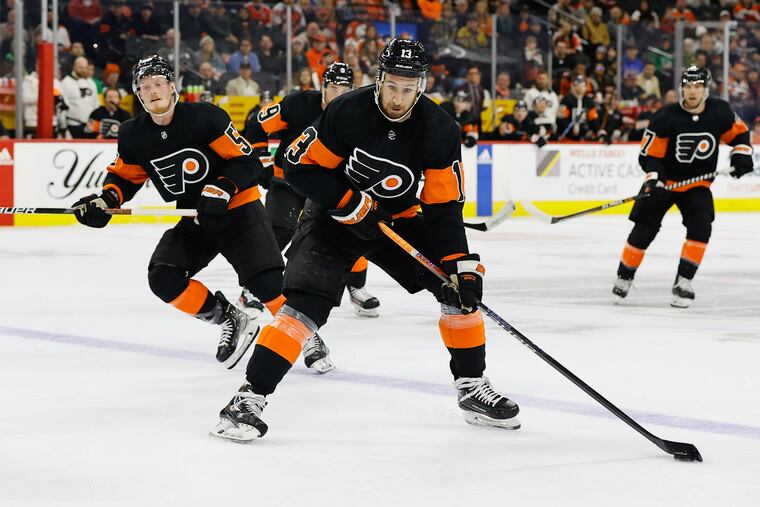Flyers trade Kevin Hayes to St. Louis Blues for a future sixth-round pick
Hayes, 31, is going to St. Louis in a salary dump by Danny Brière. The Flyers will retain 50% of his salary over three years.

NASHVILLE ― Kevin Hayes said in his exit interviews at the end of this past season that while he wanted to stay in Philadelphia, he was picking up the message about what part he’d play in the Flyers’ rebuild.
On Tuesday, after several days of reports and increased speculation, it was confirmed that he’d play no further role, as the Flyers traded their second-highest-paid player and No. 2 scorer to the St. Louis Blues for a 2024 sixth-round pick.
The Flyers will retain 50% of Hayes’ salary, totaling $10.71 million spread over three years ($3.57 million average annual value). This is Danny Brière’s second trade in a matter of weeks as general manager as he leads the Flyers into what the team has branded a “new era of orange.”
The writing seemed to be on the wall for Hayes’ exit this summer. He appeared to fall out of favor with coach John Tortorella — he was demoted from center to wing, scratched on Dec. 17, and saw his ice time and role massively decrease as the season wore on. In addition to his age (31), Hayes was limiting the Flyers’ chances to build their future with his hefty contract and potentially blocking younger players from ice time.
The rumors that started swirling in December after he was scratched picked up in the last week. It was reported Saturday that a trade with the Blues involving Hayes was in the works. There was talk of another Flyer, Travis Sanheim, being included, as well as a veteran Blues player. ESPN reported that one of the Blues’ three first-round picks could be on the table as well. However, Sportsnet later reported that the Blues player, veteran defenseman Torey Krug, would not waive his no-trade clause, and the deal ground to a halt. In the end, it turned into a one-for-one deal, Hayes for the draft pick. Blues general manager Doug Armstrong said he had monitored Hayes’ situation over the past few months.
“You’re watching and reading the media reports that a change might be there,” Armstrong said Tuesday from Nashville, where he is preparing for the draft. ”So he was a player that we talked about in our end-of-year meetings, if we want to add a top-nine forward, and he was on that list. And then you start to go to work and try and fit it in the cap and try and do different things. But we’ve done our research on him for well over a month, for sure.”
The Flyers, under previous general manager Chuck Fletcher, signed Hayes to a seven-year contract with an AAV of $7.142 million on June 18, 2019. Hayes just completed the fourth year of that deal and accounted for 8.7% of the Flyers’ salary-cap space last season.
The nine-year NHL veteran signed with the Flyers as a free agent after playing for the New York Rangers for five years and the Winnipeg Jets for 20 games. The move reunited him with his former coach, Alain Vigneault, who took the Rangers to the playoffs when he was in New York. In 253 career games with the Flyers, Hayes tallied 63 goals and 94 assists for 157 points.
Hayes became a popular teammate during his time in Philadelphia, and had just completed his best offensive season and was an All-Star despite what he called a “weird year.” He posted 15 goals and 45 points in 50 games before the All-Star break, but managed only three goals and nine points the rest of the way as Tortorella significantly cut into his ice time.
Hayes shared some of his discontent with how the season went in his exit interview, which turned out to be his last time talking to the media as a Flyer.
“I had almost a career year and was an All-Star,” Hayes said. “I never really felt like it through the whole season.”
Hayes will be looking for a fresh start with a Blues team that is expecting to compete.
“Obviously in the salary cap, it has to fit in there,” said Armstrong. “We’re going to be tight, too, to the cap when we sign our own players now. It was exciting also not to have to get to July 1 and be competing with 31 other team for players.
“You have a vision of, ‘Oh, this guy is going to fit great for us’ and then at four o’clock on July 1, he signs somewhere else and you’re saying ‘OK, well now what?’ So it’s nice to get another piece of the puzzle in place prior to that date.”